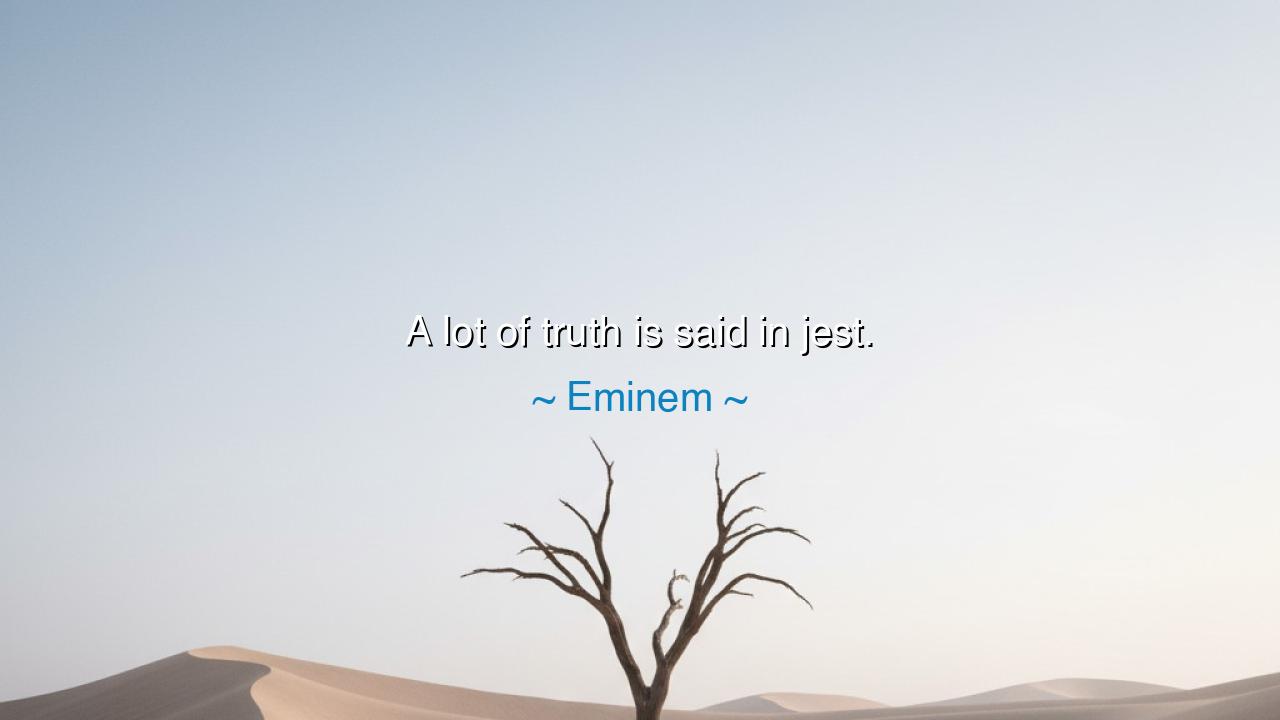
A lot of truth is said in jest.






"A lot of truth is said in jest." These words, uttered by Eminem, carry an ancient echo, for they remind us that laughter is often the cloak beneath which reality is hidden. The human heart, too fearful to speak openly, too cautious to declare its wounds, will often slip its truths into the folds of jest. What cannot be proclaimed in seriousness may yet be whispered through humor. And so, the jester becomes a prophet, the comedian a confessor, and the playful word a dagger sharper than any solemn speech.
The ancients knew this well. In the courts of kings, the fool was the only one who could speak freely, mocking the ruler while unveiling truths none dared to say aloud. Through jest, he revealed corruption, vanity, and folly. His words, though covered in laughter, struck with power. For in the safety of comedy, truth walks boldly where honesty alone would be slain. Thus, even in times when candor was dangerous, men still found ways to let truth breathe through laughter.
History gives us vivid examples. Think of Voltaire, who cloaked his fierce criticism of tyranny and dogma in satire. His wit danced like fire, entertaining his audience even as it burned away illusions. His writings, filled with jest, carried truths too perilous to be spoken openly. And though his laughter stung kings and priests, it awakened nations, stirring minds to freedom. The lesson is clear: sometimes the joke is the only safe vessel for truth, and laughter becomes the sword of revolution.
Or recall the writings of Mark Twain, who wielded humor as both shield and weapon. His tales of Huck Finn and Tom Sawyer delighted children, yet within them lay piercing truths about race, morality, and society. Twain understood that in the disguise of jest, the hardest truths could slip past defenses. He made men laugh, and while they laughed, he planted in them the seeds of wisdom. Here, once more, the jest becomes the hidden garden of truth.
Yet the wisdom carries a warning: because so much truth is said in jest, we must learn to listen deeply to laughter. Do not dismiss the playful word as mere entertainment; often it reveals the true heart of the speaker. A friend’s joke may hide their pain. A comedian’s quip may conceal society’s sickness. A child’s teasing may echo truths that adults fear to admit. Those who are wise will hear the seriousness within the laughter, the cry within the smile.
The lesson, then, is twofold. First, dare to use jest as a tool for truth when the world will not hear you otherwise. Wit can open doors that earnestness leaves shut. But second, do not ignore the truths others hide within their humor. Laughter may seem harmless, but behind it lies the raw voice of reality. The discerning heart will listen with both ears: one for the joke, the other for the truth it carries.
Practically, this means paying attention in daily life. When others joke about their struggles, do not laugh alone—listen, and offer compassion. When society laughs at its own follies, ask what deeper lessons lie beneath. And in your own speech, when truth is too sharp to declare openly, weave it gently into jest, letting it reach hearts that might otherwise remain closed.
So remember, children of tomorrow: a lot of truth is said in jest. Do not take laughter lightly, for it may carry the heaviest burdens. Let your ears be tuned to hear both the humor and the hidden wisdom. In this way, you will walk not only with joy, but with insight, and you will learn to recognize the truth, even when it comes clothed in laughter.






DMMAI NGUYEN TIEN DUNG mai
I find this quote particularly interesting because it touches on how humor allows us to convey uncomfortable truths without facing direct confrontation. When people joke about sensitive topics, is it a way of hiding the pain, or are they actually revealing something that needs to be said? How often do we use humor to speak the truth when we don’t feel comfortable doing so in a serious conversation?
UGUser Google
This quote really resonates with me because it highlights how humor and sarcasm can often point out things that are difficult to talk about. Are we more likely to accept uncomfortable truths when they’re packaged in humor? Or do we just dismiss them because they’re delivered in jest? It makes me think about how often jokes reflect reality, even though we sometimes don’t take them seriously enough to recognize their significance.
KLNguyen Nhat Khanh Linh
I’ve always thought about how humor has a unique way of revealing truths that might otherwise be hard to discuss. Could it be that jest provides a layer of protection for both the speaker and the listener? It’s interesting how jokes often contain more insight into human nature than we might give them credit for. How much of what we laugh at is really the truth we don’t want to face head-on?
ANAnh Ngoc
This quote by Eminem makes me think about how humor can often be a vehicle for deeper truths. Why is it that sometimes people feel more comfortable expressing difficult truths in jest rather than directly? Is it because humor softens the impact, or does it make the truth easier to accept? I wonder if we sometimes laugh to mask uncomfortable feelings, even though the core message might resonate more than we realize.